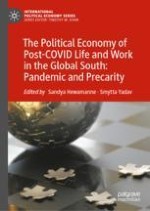2022 | OriginalPaper | Chapter
11. Supermarket Workers: Discovered and Uncovered During Covid-19 Pandemic
Author : Patrícia Rocha Lemos
Published in: The Political Economy of Post-COVID Life and Work in the Global South: Pandemic and Precarity
Publisher: Springer International Publishing
Activate our intelligent search to find suitable subject content or patents.
Select sections of text to find matching patents with Artificial Intelligence. powered by
Select sections of text to find additional relevant content using AI-assisted search. powered by
